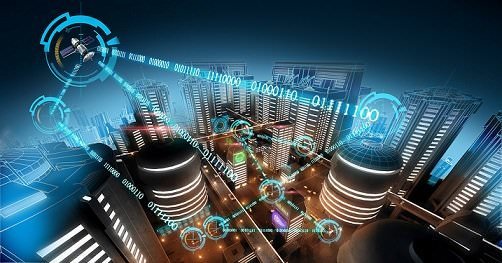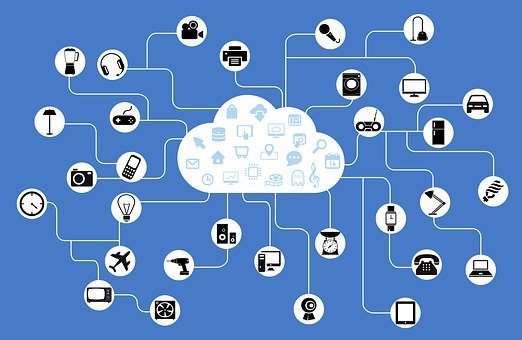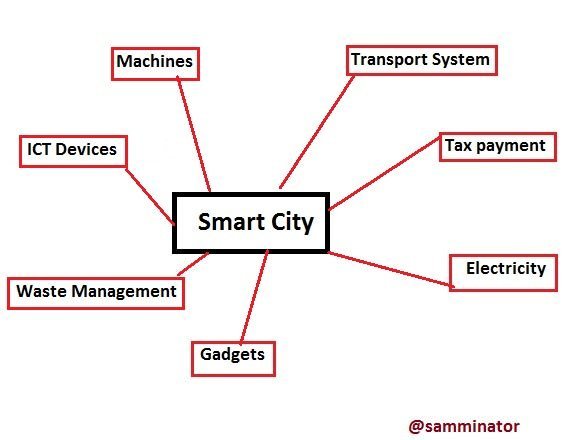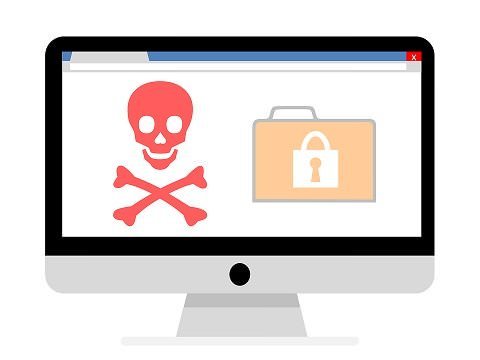Why Would "Internet Of Things" Lead To A Smart City Framework?
Introduction
Over the past few years, the kind of advancements that have been witnessed in the field of Artificial Intelligence (AI) has left humankind in awe. Just some few years back, the chatbot was invented, and the world thought that we had reached the apex of AI, but now, we've seen more complexities arriving in the field of AI. In this survey, we will be considering the possibility of intelligently interconnecting these AI-based gadgets to a centralized hub; which would enable us to have remote access to all of our devices. Sounds like a really cool idea right? Okay just hang on.

[Image Source: Flickr. Authored and culled from jct600.co.uk. CC-BY-SA 2.0 Licensed]
In the title of this post, you saw "internet of things" and "smart city", and some would be piqued to ask; what da heck are these two concepts about? I'll simplify it, so that even the uninitiated can flow along. I remember, while growing up as a kid; very many years ago; the only place where we could find computer connected to the internet was when we visited the cyber cafe. But soon after, people started having these in their homes, and that was how the popularity started. But even at that, the numbers of internet-enabled devices were just hand-full. Not too long after, the mobile phone came on the scene- I remember my first ever internet-enabled phone; an alcatel; and how it would take over half an hour just to load a simple web page over the "wap". But in this era, the usage of internet-enabled devices are seen every here and there, and the truth is; they are still growing at an astronomical rate.
Maybe this report would give you an insight. An extrapolation was made; based on the current usage of internet-enabled devices; and it was inferred that this number would hit 50billion internet-enabled devices before the benchmark of year 2020. Going by the population size (average of 7billion) divided by 50billion devices - that's an approximate 7devices per person; with an excess of 1billion devices remaining. Does this send any signals to you? This process has already been heralded though - even in these times; you'll see someone having 3mobile phones, a tablet, a laptop, a desktop computer, and a POS machine; isn't that already 7devices? - Imagine what we would have in the future.
Also, these devices produce insane data on a daily basis; which is on the exascale mode. Imagine when we have to collate all these data individually by each of our devices; wouldn't that lead to information overload? But hey! why not connect these devices as one; so the data generated by one can be assessed by others; which would reduce the possibility of data duplication and redundancy, and also makes for a better efficiency – this led to the idea of Internet of Things.
Wassup with Internet of Things?
I'll break down this term for easier understanding; "internet" and "things" - the "internet" is not an entirely new concept in this era, except you've been hibernated through time. Based on our primary school knowledge; internet is the system of interconnected set of computers. Then the "things" in this context can be attributed to our devices. So by inference, Internet of Things (IoT) is the inter and intra-connectivity of our devices together to form a complex but whole framework.

[Image Source: Pixabay. CC0 Licensed]
Have you ever heard of the assumption that "in the future, technology would hold more data about you than you can ever imagine?"Okay, well, the IoT has charted a course in this. Take this example; every of our gadgets are going "smart" - smart phones, smart fridge (yes; smart fridge - that would know when you're up to grab a bottle of soda and would remind you of your diabetic status from the data it would pick from your medical records), and all these work on the technology of Internet of Things; of which Artificial Intelligence is a bedrock in this. Maybe you would be right to infer that technology is actually spying (or rather peeking) at us.
Well, why not? After all, every of our internet-enabled devices have unique address (IP; as the case may be) that would leave a digital signature of our presence online. Imagine a scenario like this: You go to an automated dispensary to grab some pizza snacks; it would require you to input your personal identity number, and on putting this number, it would trace your info down to every possible details, and finds out that from your last visit to the doctor, you have a high cholesterol level, and eating pizza would harm your health. It would suggest other alternatives (maybe fruit and stuffs). But on looking at your financial records; you'd be at a deficit balance if your order beyond limit, and blah, blah, blah... you may just end up having the option to order only water, lol.
But in all these instances I gave; the data collated are just personalized - that is; they are data about you, but what if we go a little further to data about; maybe; places, other areas in the metropolis, or even an entire city? Now that's a step ahead of IoT into what we call the "Smart City".
Wassup with smart city?
Just like the name suggests; this is the collection of IoTs that would allow the people within a particular city or metropolis to interact with data and information. Maybe this example would drive home some points: Have you ever driven into a mall with the hope of finding a free parking space right at the entrance to the mall? But when you get there, oopss!! the place is already filled up, so you have to do a merry-go-round to look for a space. Okay, imagine when the Parking Lot is incorporated with sensors that would sense when a car leaves a particular spot; these sensors can interact with your own car signaling system to detect if there's a free spot even when you're still approaching; so you wouldn't just drive blindly. Now that's example of what is obtainable in a smart city framework; wouldn't that simplify our lives? And the truth is; these sensors can spread all over the city; not just the car parks alone - take a look at a pictorial representation below.

[Image Source: Home made by me @samminator]
By inference; even though the smart city incorporates the Internet of Things (at least the devices would have to be connected to the internet), but it also incorporates machine learning (a system by which AI can acquire new sets of info over time), and even machine teaching (transference of the acquired info from machine to machine - or rather, from AI to AI), just like the case I gave to you about the car park that interacts with your car to find a free spot. Look at another scenario: In the place where I grew up; the dumpsters could get filled up for days without the garbage truck coming to get them trashed - I mean; they pass by once a week, but shit happens, and it could get filled up before the next pick-up, and it would pollute the entire neighborhood. But when you have a smart dumpster; for example; when the garbage gets filled to a certain level, it would trigger some sensors that would send messages to the authority, informing them that they need to come and trash the dumpster. Not to talk of other smart gadgets; like the traffic light, the smart street light (which would get triggered on its own when the visibility is not friendly enough), the depth-resolution smart CCTV cameras, etc.
So you see, Smart City makes info available and usable at our disposal. But one thing is drawing people to have reservations about this idea, which is - "If this tech would know so much, and have so much data about us, wouldn't our privacy be contravened?". Now that's the real threat, and coupled with the fact that most of these data are stores in the cloud, it could gain freer accessibility than if it is localized. Actually, the "urbanization" that we hope to achieve with the Smart City framework would definitely come with its own pecks. But hey! Ideas have been raised. For the fact that the major data being utilized in a smart city is done in real time (like the car park scenario I gave earlier), an implementation can be made that would encrypt the generated data at the point of sending, and then on reception, it would be deciphered by the device at the receiving end. So even if there's a breach by a third party, the info would almost be useless for them. I guess one of your fears has been warded off. Also, the data not in use could be vaulted in a personalized vault, and only accessible with the person's identity number being inputted.

[Image Source: Pixabay. CC0 Licensed]
Really, this technology has a lot of potentials in it. Talk about in our heath care; the doctors would have access to the existing medical history of the patients. Or even in telemarketing for example, the business owners would have idea of the individual preferences of the customer. Like I use to tell people; this is an era in which data and information would be placed in our finger tips.
Conclusion
The advances in AI have led to the idea of the Internet of Things, but more than that, ideas are here and there to integrate these IoTs selectively and intelligently to form the smart city. I guess we're getting closer to when we would bid a permanent farewell to the analog, and embrace digitalization fully.
Thank for reading
Reference for further reading:
- Internet of things agenda/IoT
- Smart City Mission.pdf
- Gamalto -Smart City
- Concep of IoT
- Internet of things agenda - Smart City
- Insight on Smart City - Deloitte
All Images are CC Licensed and are linked to their sources


gif by @foundation
Thank you for explaining all this in a rather engaging way Sammi :) You delivered explanations to things here that I have often heard of, but didn't care much to look for what they really meant (e.g the IoT).
The Smart City scenario sounds very futuristic, right? Communication between a car and the parking space? Between the garbage truck and a smart-dumpster?
Well, when you realize that systems like the NHS (in the UK) already have national patient database in place (which, by the ways, was hacked not loong ago), the smart city doesn't sound too far fetched. I guess.
Enjoy your evening my dear :*
Thanks a lot for your nice comment Abbey. I'm glad you found the post quite explanatory.
These communications within and between our devices are just little compared to what we would expect with the implementation of a fully automated smart city. Maybe we can go beyond that to human-device communication too. What do you think?
Have a blessed evening Abbey
The world is getting smarter every day so are the devices. Now you can check the yield of your solar power system right from the comfort of your office anywhere in the world. Watches are smart too; you can synchronise and monitor the physical activities of your friends simply by them allowing you permission to do so. The ramification is exciting as well scary as the once private things are no longer secret. Little wonder people in the know like Mark Zuckerberg puts a masking tape over their webcam as you never can tell who is peeping into your daily activities as long a PC is connected online!
Masking of webcam has been my practice for long.. because you can't be too sure of even your anti spyware.
I saw a hacking documentary sometimes back, that showed it is possible to boot a system remotely without even being physically present there; and taking any info you want... what can't technology do?
Thanks for coming around baba
I'm not that paranoid, maybe because I'm a bot :)
Posted using Partiko Android
Lol. I believe you're a bot. That makes two of us 😂😂
Well done. This is really interesting infirmation. My understanding is that many smart City applications don’t involve personal data at all. Examples include managing city lighting with automation (sensors and wireless communication modules) to reduce power consumption, wastewater treatment (managing industrial tanks remotely and monitoring flow and other data), as well as first responder applications — notifying emergency personnel of the location of emergencies and the best routes for getting there, etc. So it’s not all about AI, or about personal information. 😊
You're right. But with the integration of Internet of Things, we would definitely be incorporating personal data into it.
Thanks for the comment
Very engaging piece, very futuristic.. Technology is definitely changing the way we do things.
Exactly bro. Tech has really changed almost every aspect of our lives